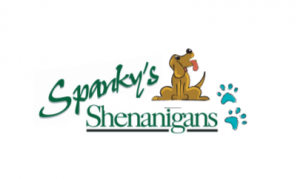

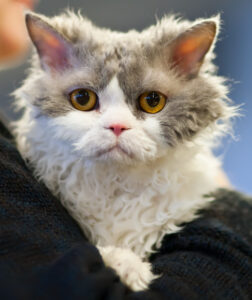
Studies have shown that cat owners may experience better mental health than individuals without pets. Cats are great stress reducers. Just 15 to 30 minutes of quality time with a cat can calm your nerves and boost your mood. When you spend time with a cat, your production of serotonin (a chemical that boosts feelings of well-being) goes up, and your cortisol levels (a buildup from stress) go down. Adults and children alike report feeling happier and having more positive feelings if a cat is part of their family. How could you not feel better with a purring ball of fur curled up beside you? And, if you adopt from an animal rescue or shelter, you will feel extra warm and fuzzy that you just saved a precious little life.
If the prospect of warm fuzzies isn’t enough, the Humane Society of Loudoun County has laid out five more reasons cats make great pets.
-
They’re Fairly Self Sufficient
Remember, they chose us. Cats have remained fairly unchanged genetically, meaning they are still capable of living in the wild (but we do discourage allowing domestic cats to roam outside). Cats are still incredibly low maintenance, and very independent, and self-sufficient. Cats also groom themselves, so they don’t need frequent baths. We do, however, recommend they have their teeth and ears cleaned regularly.
-
Small Space, No Problem
Cats are also perfect for apartments or city living. They don’t need a huge backyard or tons of space to play and explore. They are content with nosing their way through the nooks and crannies of your home. As long as you give them plenty to do and have toys available to keep them entertained, cats are happy. A living space and a basic feather toy might be all you need to make playtime a breeze.
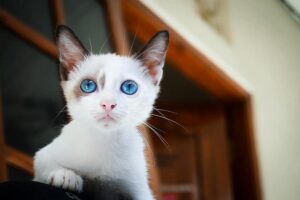
Cats can often adapt easily to smaller living environments if you give them a lot of vertical space to move around in, such as cat trees and cat “shelves” that are mounted on the wall.
-
Housebreaking Made Easy
Cats are really good at learning potty training on their own. They like to have their own space and privacy so provide one litter box per cat, plus an additional box, and kitty litter, and they will be happy.
-
Shhhh
Worried that bringing a pet into your home might disrupt things? No worries! Cats are relatively quiet animals; they are almost always in stealth mode. Yes, they’ll meow every now and then, but you don’t have to worry about them barking or even making much noise when they walk.
-
They Bring the Love
The main reason people become pet owners is because of an innate love or affinity for animals. Cats bring tons of love and joy into a household. They are wonderful pets and companions.
If you want to take part in National Cat Lovers Month, please consider adopting through the Humane Society of Loudoun County. There are plenty of cats available for adoption so make sure you take the time to read through all the available information on our website in order to make a fully informed decision. Your future cat companion may be just a click away!
Bonus Way to Celebrate National Cat Lovers Month:
FOSTER
While fostering is still a commitment, it is a more temporary way to help out an animal in need. Your individual attention will give a cat a boost of confidence until it finds its forever home. And if you are interested in fostering, consider fostering a senior cat, a special needs kitty, or an orphan kitten. Follow this link to learn more about fostering through the Humane Society of Loudoun County.

“He’s as happy as a clam!”
These were Diane Rice’s words after deciding to adopt Rebel (“Reb”) – a senior dog she had been fostering for two months through the Humane Society of Loudoun County (HSLC).
I recently had the pleasure of speaking with Diane, one of HSLC’s board members and foster parents. Over the past few years, Diane has fostered seven dogs 8 years old and up, two of them with HSLC. She offered some insight on how rewarding it is to foster and adopt senior dogs.
Diane and her husband, Mike, began to take in older dogs as they grew older themselves. Although senior animals sometimes come with health problems, HSLC covers all necessary medical expenses when fostering, including spaying and neutering. They found joy in giving these dogs the best lives they could for as long as possible.
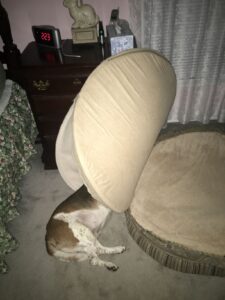
Reb doing his best impression of a taco– with help from his cave bed.
Rebel was rescued from an abusive household in which he was neglected and threatened by his owners. The Rices offered a safe and caring home where he could heal both emotionally and physically. They didn’t change his name which is important when taking in older dogs as it helps them to adjust more readily to their new environment.
After just a few weeks, they decided that Reb belonged with them for whatever time he had left. We can only imagine how thankful he was for their care.
One of Diane’s fondest memories of Rebel was when he would burrow under the blankets and towels in the house. Taking this cue to heart, she bought him a cave bed. Late one night, Rebel was sleeping peacefully in his new bed and it looked like he was wrapped up in a taco shell!
Recently, Reb passed away with Diane and Mike by his side. Diane shared the sad news on Facebook:
This dear little old man left us tonight for the Rainbow Bridge. Rebel was 14 and the sweetest Beagle ever. Although he had only been with us for a little over a year, we enjoyed every day of our time together. He was a real Momma’s boy and LOVED belly rubs and food food food! We will miss him so very much!
You can’t change a senior dog’s past. But, you can give them the care they deserve in their golden years. In return, they will reward you with boundless affection, devotion and love.
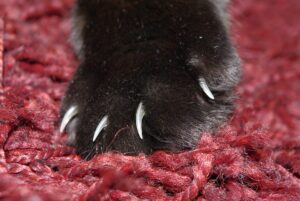
UPDATE: As of July 1, 2024, both Virginia and Maryland have outlawed declawing in most cases.
Scratching and clawing behavior is one of the reasons cats are often rehomed or not adopted. While declawing can seem like a viable solution, this controversial procedure actually creates more problems than it solves.
Why do cats scratch/claw?
- To “sharpen” their nails. Like any other animal, cats’ nails are constantly growing. This means that the outer husk of their nail dies off as the new nail emerges underneath. Often, cats scratch things in order to shed this husk. Not only does scratching “sharpen” the nail, it makes the cat feel better.
- To stretch their muscles. If you have ever witnessed a cat scratching or clawing something, you can attest to the fact that they often stretch out their front legs as far as they can go. Like the downward dog pose in yoga, this opens their body up and feels good.
- To mark their territory. When a cat scratches something, it leaves its scent behind on that object. Other cats can smell this and are warned of their trespassing. This is often comforting to the scratcher, especially the insecure ones, and makes them feel more at home.
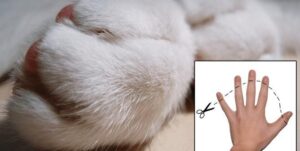
If performed on a human being, declawing would be like cutting off each finger at the last knuckle.
What is declawing?
- The declawing procedure is referred to as an onychectomy. Per Merriam-Webster, this procedure is the “surgical removal of a toenail or fingernail”. However, the surgery itself involves using either a sterile nail trimmer, surgical blade, or laser to literally cut through the bone of the third digit of the toe, which is the bone from which the claw grows.
Why is the procedure so harmful?
- It is very painful. Imagine getting the last digit of your toes or fingers cut off. It would be difficult for you to walk or use your hands and feet for a while after the procedure.
- It can cause complications, diminishing the cat’s quality of life. A cat without claws is unable to defend itself and may become a biter because they no longer have their claws for defense.
- In addition, even when the procedure is done with great precision, it can leave the cat with an altered way of walking which can lead to the development of arthritis.
- For several days after surgery, shredded newspaper is typically used in the litter box to prevent litter from irritating declawed feet. This unfamiliar litter substitute, accompanied by pain when scratching in the box, may lead cats to stop using the litter box.
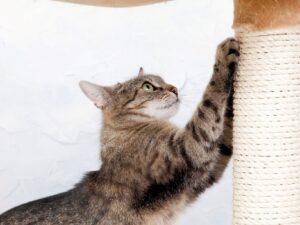
Train your cat to use a scratching post by sprinkling it with cat nip.
What are the alternatives?
- If adopting a young cat or kitten and a scratching problem is noticed, it is important for the owner to train their cat where it is appropriate to scratch, and where it is not. Scratching posts, boards, and furniture are available for sale almost anywhere pet products are sold. Because clawing and scratching is a natural behavior, kittens and young cats that have access to the appropriate scratching tools will use them.
- There are some cats that will just scratch whatever they see first, whether it be a scratching post or your grandmother’s antique chair. There are products that are meant to deter or attract cats from scratching. For example, something as simple as sprinkling cat nip on the scratching post can entice the cat enough for them to scratch there. There is also tape that can be applied to vertical surfaces of furniture. This tape is meant to be safe on furniture but uncomfortable for the cat when they attempt to scratch.
- Nail Caps. Talk to your veterinarian or local pet store employee about nail caps. These are made to fit over your cat’s nails and stay on with glue. Often made of soft plastic, the cat cannot do as much, if any, damage when scratching with them on.
- Frequent Nail Trims. As stated before, cats’ nails are constantly growing. By trimming them every week or two, the cat will not feel the need to scratch as much.
Declawing is illegal in over 40 countries and counting. Several cities in the U.S. have banned declawing. And, last year, New York became the first state to ban the procedure except in rare cases when it is medically necessary. The American Medical Veterinary Association (AMVA) “discourages the declawing (onychectomy) of cats as an elective procedure and supports non-surgical alternatives to the procedure.” HSLC does not condone declawing and will refuse an adoption if the candidate plans to declaw.
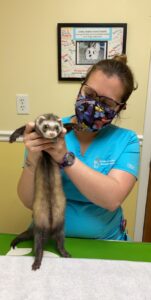
By Heather Nokes
What day is it? Those of us who have been at home for weeks on end are having trouble keeping track. But you know what we are doing? Spending more time with our pets! This means paying more attention to them, their behaviors, and their health. Luckily, veterinary clinics and hospitals are deemed essential businesses. As a seasoned veterinary assistant, this author (see photo) and her colleagues want pet owners to know a few things in this uncertain time.
Our hospitals are just as busy, if not more so, than usual: With people having more free time on their hands, they are able to bring their pet in for routine visits. This is fantastic! However, some veterinary clinics and hospitals are reducing their business hours to protect their staff from exposure. And those hospitals that are running at a normal capacity are filling appointments quickly. It is also important to keep in mind that most of us are doing telemedicine and curbside service which often take up more time than normal office procedures.
We WANT to see your pet… if they are sick: Because of the above listed adjustments, your veterinary hospital may be prioritizing sick visits. This means routine vaccinations and preventative care exams are being put off for weeks or even months.
We act different when you are not around: When we take your pet from you, we understand that it can be nerve-wracking for both you and your fur baby. We take this into account and tend to baby your pet more than you would expect behind closed doors. Not many jobs allow you to use baby talk and cuddles but your veterinary staff is well versed. We do this because we genuinely care for animals and always treat our patients like our very own pets.
At this point, there is no evidence that animals play a significant role in spreading the virus that causes COVID-19: According to the CDC, the risk of animals spreading COVID-19 to people is considered to be low. CDC is working with human and animal health partners to monitor this situation and will continue to provide updates as information becomes available.
Of course, if you have concerns or questions about your pets in this uncertain time, your veterinary hospitals are more than happy to speak with you over the phone. And as always, in an emergency, take your pet to the nearest emergency clinic ASAP!
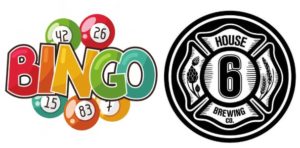
The Humane Society of Loudoun County is excited to partner with House 6 Brewing to raise funds by having Bingo nights! Bring your family and friends to this monthly event where the Bingo Card donations go directly to help animals in Loudoun County.
8 games will be called. A packet for all games can be purchased for $15 or individual regular games are $2 and the final game is $3.
Melissa starts calling Bingo at 6:30 pm. Prizes will be given each game and are donated from House 6 Brewing, HSLC and other local businesses.
HSLC THANKS House 6 Brewing Co. for their support.
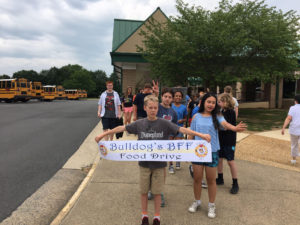
Students in all three grades collaborated on a Pet Food Drive called Bulldog’s BFF after the school’s mascot. Sixth grade Keyboarding students designed promotional posters. Seventh grade Family and Consumer Sciences students made cat toys. Seventh grade TechEd students created the logo to brand the campaign. Lastly, eighth grade manufacturing students created food bowl holders.
During the week of May 13, BRMS students brought in dog and cat food along with pet supplies to donate to the Loudoun Pet Pantry. Subsequently, Juanita Easton, President, accepted these donations on behalf of The Humane Society of Loudoun County on June 5.
HSLC is deeply grateful to the students, faculty and administration of Blue Ridge Middle School for helping the animals of Loudoun County. To host a pet food drive at your school, organization or community, please visit our website for help in getting started.
Moreover, you can drop off dog and cat food donations to one of several donation boxes located across the county. The Loudoun Pet Pantry accepts canned and dry cat and dog food. Dry food must be unopened, unexpired, non-prescription adult food. We cannot use kitten, puppy, or senior food for the pet pantry. Because space is limited, we can only use bags of dry food between 4 and 8 pounds. However, we can use all sizes of canned food.
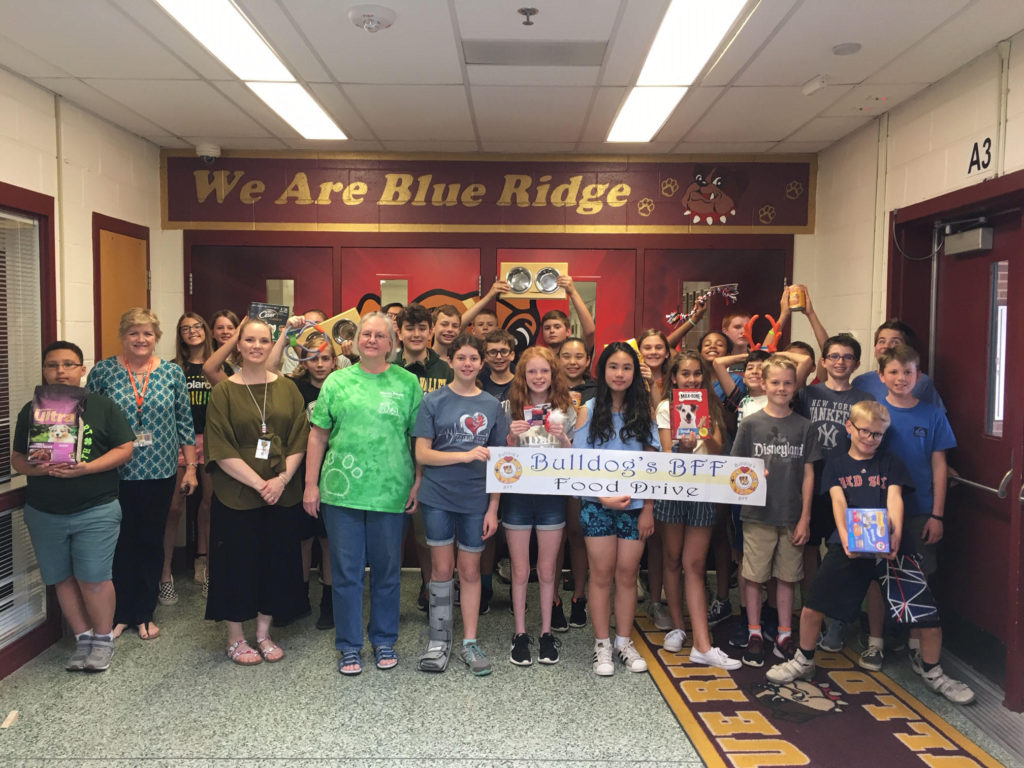
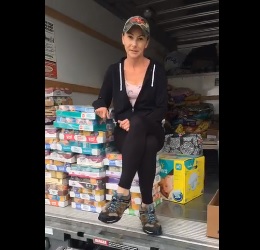
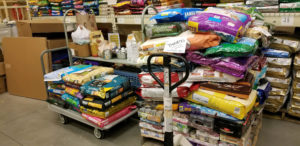 Some other area animal rescues stepped up to work with us. Fancy Cats collected pet food donations and HART volunteer Kerry Kieger and crew helped at our trucks.
Some other area animal rescues stepped up to work with us. Fancy Cats collected pet food donations and HART volunteer Kerry Kieger and crew helped at our trucks.
We put out a plea for donations and the response was overwhelming. Avalon Consulting provided pet food donations as well as monetary donations for us to buy supplies to take down to the hurricane relief area. Clarus Merchant Services was very generous to provide donations allowing us to rent two trucks for all the supplies we collected and cover expenses there and back. HSLC donors also stepped up to provide funds for us to buy supplies for the hurricane victims.
We contacted Spanky’s Shenanigans in Leesburg for some advice because they helped with Hurricane Harvey last year. 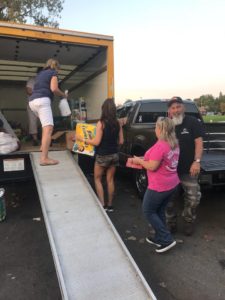 They immediately offered to help us “stuff a truck” at their weekly Wednesday Yappy Hour. Thank you to owner Azmi, servers Katie & Joanie, and all their wonderful friends and patrons (both two and four legged) who helped. Just a few doors down, our friend Darla at the Leesburg Petsmart worked to collect a large pallet of pet food donations, personally delivering them to Spanky’s.
They immediately offered to help us “stuff a truck” at their weekly Wednesday Yappy Hour. Thank you to owner Azmi, servers Katie & Joanie, and all their wonderful friends and patrons (both two and four legged) who helped. Just a few doors down, our friend Darla at the Leesburg Petsmart worked to collect a large pallet of pet food donations, personally delivering them to Spanky’s.
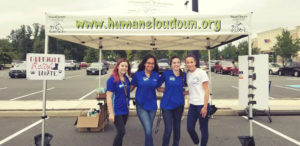 Our “stuff a truck” efforts didn’t end at Spanky’s. We obtained permission from the Dulles Landing Petsmart in Chantilly to park our truck at their store to continue collecting donations from Friday to Sunday. Thank you to managers Corey, Andrew, and Lauren. Coal Fire Pizza manager Alexandra ran into us in the parking lot and set up a fundraiser at their restaurant to help with the cause.
Our “stuff a truck” efforts didn’t end at Spanky’s. We obtained permission from the Dulles Landing Petsmart in Chantilly to park our truck at their store to continue collecting donations from Friday to Sunday. Thank you to managers Corey, Andrew, and Lauren. Coal Fire Pizza manager Alexandra ran into us in the parking lot and set up a fundraiser at their restaurant to help with the cause.
HSLC was already scheduled to attend the “Caturday” event at Gum Springs Library on Saturday Sept 22nd so we arranged to have the donation truck in their parking lot that day. Thank you to Jessica Moore and team!
On the evening of Sunday September 23rd Jennifer, Katie, and Kyle set out to deliver our relief supplies to NC. After navigating though the hurricane devastated areas, their first stop was at A Dogs Dream in New Bern. This was one of the harder hit areas. A Dogs Dream is a boarding and grooming facility which opened up their doorsto receive donations and continued to be a distribution point during the coming weeks.
Watch this video of Jennifer and team at A Dogs Dream.
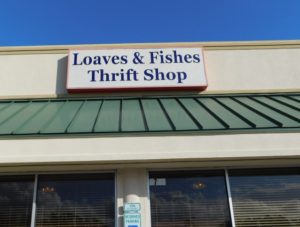 The next stop for our intrepid wanderers was to Loaves and Fishes in Beaufort, a ministry pantry that acted as a distribution center for the pets and people of Beaufort in need of supplies. It’s ran alongside local churches there. Craven Pamlico Animal Services Center received donations as well. Both of these facilities continued to get the call to help for weeks to come.
The next stop for our intrepid wanderers was to Loaves and Fishes in Beaufort, a ministry pantry that acted as a distribution center for the pets and people of Beaufort in need of supplies. It’s ran alongside local churches there. Craven Pamlico Animal Services Center received donations as well. Both of these facilities continued to get the call to help for weeks to come.
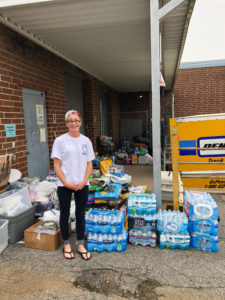 Then it was on to Cause for Paws in Raleigh, our point of contact for finding out where the supplies were needed. They were one of the rescues who helped the over 200 animals at the Raleigh fairgrounds and continued to help flood victims in the continued weeks.
Then it was on to Cause for Paws in Raleigh, our point of contact for finding out where the supplies were needed. They were one of the rescues who helped the over 200 animals at the Raleigh fairgrounds and continued to help flood victims in the continued weeks.
Thank you to all the HSLC volunteers who helped to make this happen: Melissa, Anne, Molly, Christina, Kerry, Theresa, Juanita, Sharon, Julia, Melanie, Katie, and Kyle. And, of course, a big thank-you to Jennifer.
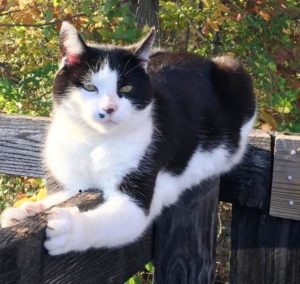
Humane Loudoun’s “Critter Control” program is a form of organic pest control that can help keep rodents away from grain, food storage, etc. They are a cleaner, more effective alternative than dangerous pesticides and they are on duty 24/7. The adopting local businesses will enjoy their company from afar as well as having the satisfaction of giving them a much-needed home. If you currently have unspayed barn cats, you can also receive assistance in having them sterilized.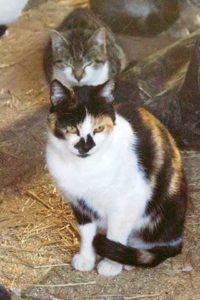
Humane Society of Loudoun County is an all-volunteer, no-kill, registered non-profit 501(c)(3) organization. If you own or manage property like those previously mentioned, and have permission for long-term placement of animals on the property, please contact the Humane Society of Loudoun County at helpanimals@humaneloudoun.org. For more information visit our website.
